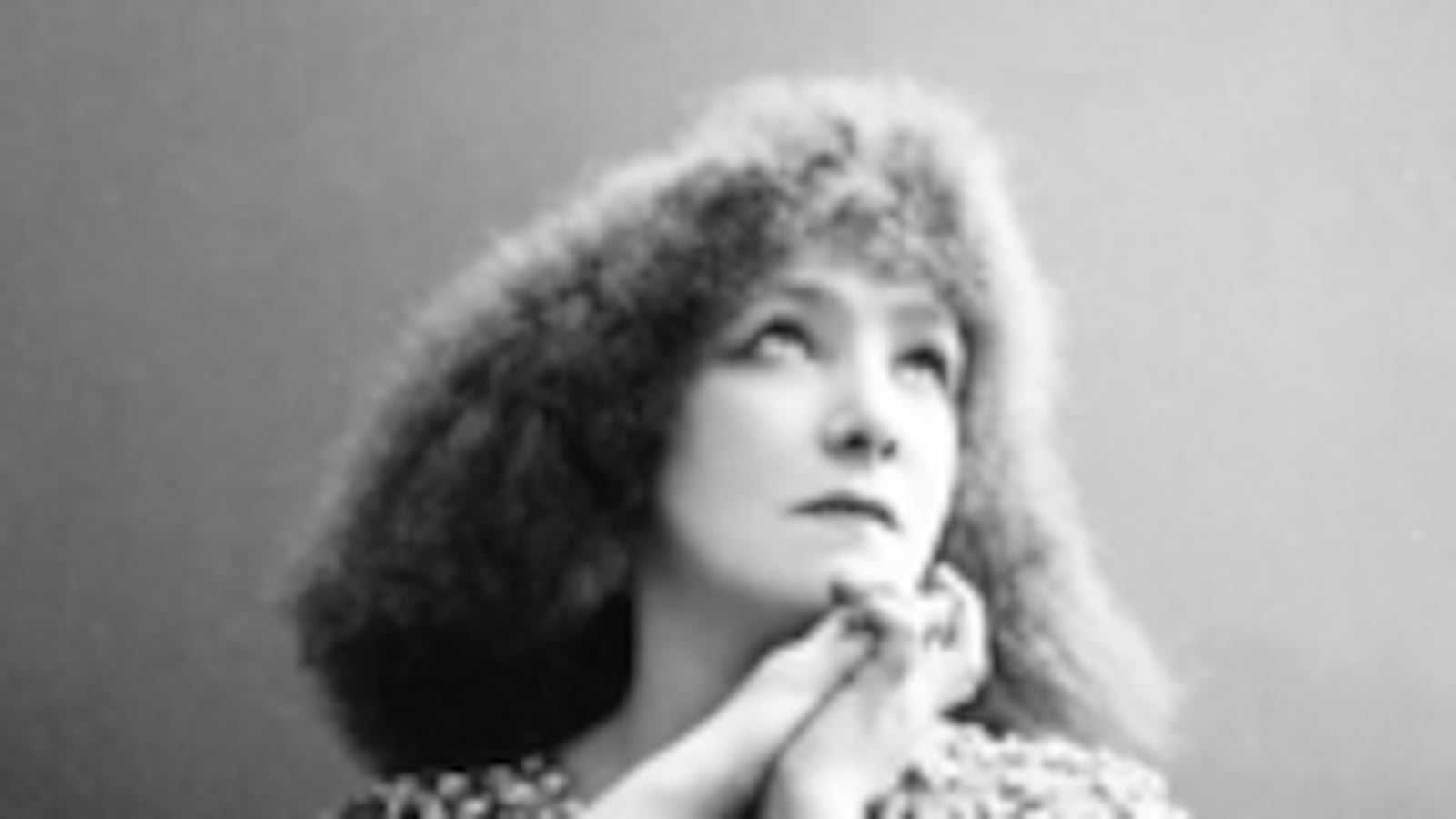
Even almost a century after her death, Sarah Bernhardt, the French actress whose extraordinary personality, flamboyant life and passionate nature became a legend in her own lifetime, remains the byword among most people as the supreme theatrical star. It is not only among Jews of Central European origin that the phrase, "You're a regular Sarah Bernhardt," came to represent parental scolding of a temperamental and over-emotional girl—even in places as remote from the Comédie-Francaise as Texas, the phrase was in use in the 20th century, and for all I know, still is. Sarah not only defined the highest peak of acting in the late 19th century, even among people who did not understand a word of French, she also defined for many the ideal of a strong, independent woman, who made her own way in life, and got everything she wanted out of it. She was Jewish, she was a woman, but despite these disabilities and more, she forged one of the most remarkable and independent careers in the history of the theater, and became one of the first, if not the first, worldwide celebrities. Not even the most famous and successful movie star or pop star of today is as famous, admired, or controversial and scandalous as was Sarah in her day. Norma Desmond herself would have been blinded by the sheer intensity, sustained over decades, of Sarah's reign as a star, and her hold on the popular imagination.
One ends this breathlessly readable and deeply intelligent book in as much awe of Sarah as people and audiences were in her own lifetime.
It is no surprise to me that Robert Gottlieb has written a wonderful book, and still less of a surprise that he has managed to cut through so many of the layers of legend surrounding the life of the great Sarah Bernhardt (without in any way denigrating or diminishing those legends) to get at the facts, or at any rate those facts which Sarah Bernhardt herself did not reinvent during the course of her life. “ Nourri dans le sérail je connaîs les détours.” When it comes to stardom Gottlieb knows what he is talking about. As the legendary editor of The New Yorker, editor in chief of Simon & Schuster, and at Alfred Knopf, he had star quality himself to a degree that was unusual, even remarkable in a business that was hitherto known for tweedy, pipe-puffing nonentities, and was at his best with authors (John Cheever, Toni Morrison, Joseph Heller, Bob Dylan, among others) who themselves had star quality, or whom he could transform into stars, not always an easy task with writers.

Of course, the essence of stardom is a willing suspension of disbelief on the part of the audience: the star must have the magic power to make us, the audience, whether in the theater or in private life, accept that he or she is something different from what he or she might appear to the naked or skeptical eye. Stardom is in part a confidence trick, a kind of hypnosis, fueled by an enormous need on the part of the star to reach out for our love, our admiration, and above all our willingness to suspend for the time being our normal sense of caution and reasoned judgment, so that we no longer see the real person, but succumb instead to the demand of a superior will to see them as they see themselves, or at least to accept as real the glittering persona they are able to project of themselves.
In my own life, I have known many such persons, by no means all of them actors—indeed one of them is Gottlieb himself. For some, beauty is part of the equation as well as talent, one thinks of Vivien Leigh in the past, and perhaps of Angelina Jolie today; for others physical attraction is unimportant—even in his bulky, overweight, disappointed and dissipated old age, for example, Orson Welles could project a star quality that could leave one breathless, literally unable to resist the sonorous voice, the piercing eyes, the enormous presence, his view of himself as not only a genius, but as the center of the world. One felt humbled and honored at being allowed to pick up the check, whether for a meal, or another failed production or unwritten autobiography.
Sarah Bernhardt was and remains a star among stars; not only a star, she was the star, perhaps the first person at the dawn of the age of modern newspaper photography to combine genius, immense ambition, a scandalous private life, an extravagant sense of drama and an extraordinary appearance, and to imprint herself indelibly on the imagination of people all over the world. Of course, as Gottlieb rightly points out, the fact that she was Jewish and French is a hugely important part of her character, and of the soaring arc of her career, which survived old age, the loss of her famous beauty, and even the amputation of one leg above the knee, prompting a younger actress summoned into her presence to remark, “Beneath the painted and tinted decrepitude of the old actress there burns an inextinguishable sun.” Indeed. That is as good a description of stardom as we are ever likely to get. (I once had dinner at Gallagher’s steak house in New York City with Laurence Olivier in his old age, who sat unnoticed by diners at the tables all around us, and then, to make a point about acting, suddenly launched into the opening speech of Richard III, which had confirmed his reputation as the leading star of wartime Britain, in a voice that silenced even those who were sitting noisily at the bar, brought the whole restaurant to an awed hush of recognition that a star was in their midst.)
Gottlieb is brilliant, well-informed, and fascinating on the subject of Sarah’s acting, and writes with great precision about the theater of her time and how she came to dominate it. He is as good on the subject of her personal life, itself a neverending tumultuous drama and struggle for domination from earliest childhood on, from half sisters who died young, to a son who may or may not have been fathered by a Belgian prince, to her relationship with lovers, husband, playwrights, kings and fellow geniuses. Sarah had to an extravagant degree the qualities that make for genius: immoderate energy, truly Bergson’s élan vital (she was not French for nothing), soaring ambition, a dominating and impatient personality, courage and sheer ego. One feels that much as she filled a theater, she must have drained the energy out of a room by the sheer magnetism of her presence.
Although Gottlieb’s book is short (he must have applied to himself his own advice to authors to cut, cut, cut) it is positively jam-packed with anecdotes, wonderful stories, brave attempts to cut through Sarah’s lifelong self-creation of herself as a heroine towards something approaching the truth, and, at the same time, to make us care as he does for her extraordinary personality, for she is always on-stage, always feeling emotions at their highest peak, always ready for new challenges, always loyal in her own way to those she loved, always, unapologetically a bigger-than-life person, but at the same time tiny, gay, charming and endlessly appealing. One ends this breathlessly readable and deeply intelligent book in as much awe of Sarah as people and audiences were in her own lifetime; it is that rarest of books, a serious biography that reads not only like a novel, but like a big, romantic, sprawling, over-the-top novel, The Best of Everything, perhaps, or The Secret of Santa Vittoria, the kind that nobody writes anymore. Sarah’s love for outlandish and inconvenient pets, her extravagant gestures (no longer a feature of acting today), her habit of sleeping in a coffin, her heroism in war, her joie de vivre make this a book to read with pleasure. Indeed, Sarah is more fun than one expects a book from a university press to be, and also lavishly well-illustrated—in fact, the pictures alone make the book worth having, if only to admire Sarah’s chameleon-like ability to become whatever she wanted to be, including Hamlet, Macbeth (!) and Joan of Arc. Gottlieb has made of her story a wonderful book—one, which, to pay it its highest due, any editor, including himself (and me), would give his or her eye-teeth to have published!
Plus: Check out Book Beast for more news on hot titles and authors and excerpts from the latest books.
New York Times bestselling author Michael Korda's books include Ike, Horse People, Country Matters, Ulysses S. Grant, and Charmed Lives.






